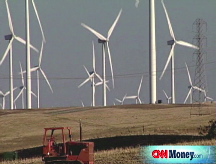The economy shrank more than expected in the third quarter and home prices fell to levels not seen since early 2004 as the government announced new plans to provide $800 billion to boost consumer spending and home buying.
Treasury Secretary Henry Paulson said key markets for consumer debt such as credit cards, auto and student loans essentially came to a halt in October, and that the new programs are aimed to get lending back to more normal levels.
Meanwhile, data released Tuesday provided further proof the country is almost certainly in the throes of a painful recession.
The Commerce Department's updated reading on the economy's performance showed gross domestic product shrank at a 0.5 percent annual rate in the July-September quarter, weaker than the 0.3 percent rate of decline first estimated a month ago, and the worst showing since the third quarter of 2001.
GDP measures the value of all goods and services produced within the U.S. and is considered the best barometer of the country's economic fitness.
Meanwhile, the Standard & Poor's/Case-Shiller national home price index released Tuesday tumbled a record 16.6 percent during the quarter from the same period a year ago. Prices are at levels not seen since the first quarter of 2004.
In an effort to increase the availability of home loans to borrowers, the Federal Reserve said it will purchase up to $100 billion in direct obligations from mortgage giants Fannie Mae and Freddie Mac as well as the Federal Home Loan Banks. The Fed also will purchase another $500 billion in mortgage-backed securities, pools of mortgages that are bundled together and sold to investors.
The $600 billion effort on mortgages came as the Fed also unveiled a new program to help unfreeze the market that backs consumer debt such as credit cards, auto and student loans.
The program on consumer debt will lend up to $200 billion to the holders of securities backed by various types of consumer loans. Paulson said recently that the government was working on the new program, which will be supported by $20 billion of credit protection provided by the $700 billion bailout fund.
The government, while looking to reduce fear in the credit markets, is eager to see lenders like credit card companies resume more normal levels of lending to help stimulate the economy. Since September, when credit markets first froze, financial institutions have been hesitant to hand over money for fear they won't be repaid.
That, in turn, has made it harder for businesses and consumers to borrow.
Meanwhile, Wall Street was poised to extend its advance to a third day. The Dow Jones industrial average added more than 70 points in morning trading Tuesday.
Meanwhile, the New York-based Conference Board says its Consumer Confidence Index for November was 44.9, up from a revised 38.8 in October. Last month's reading was the lowest since the research group started tracking the index in 1967.
Economists surveyed by Thomson Reuters expected the November reading to slip to 37.9. Still, this month's figure hovers around levels not seen since December 1974, with Americans' views on the economy the gloomiest in decades as they grapple with massive layoffs, slumping home prices and dwindling retirement funds.
Consumers nationwide are reeling from job losses, tanking investment portfolios and sinking home values. They are expected to hunker down further in the coming months, making it likely the economy will continue to shrink through the rest of this year and into 2009, more than fulfilling a classic definition of a recession: two straight quarters of economic contraction.
AP Business Writers Jeannine Aversa, Martin Crutsinger, Tim Paradis and J.W. Elphinstone contributed to this report.
Copyright 2008 Associated Press. All rights reserved. This material may not be published broadcast, rewritten, or redistributed
'Business' 카테고리의 다른 글
| Cyber Vigilantes' Guerilla Tactics (0) | 2008.11.26 |
|---|---|
| Broadband makes tiny town an English-teaching hub (0) | 2008.11.26 |
| Wall Street pulls back after big 2-day rally (0) | 2008.11.26 |
| Disaster-Proofing The Cloud (0) | 2008.11.26 |
| The Market For Yahoo!'s CEO (0) | 2008.11.26 |






